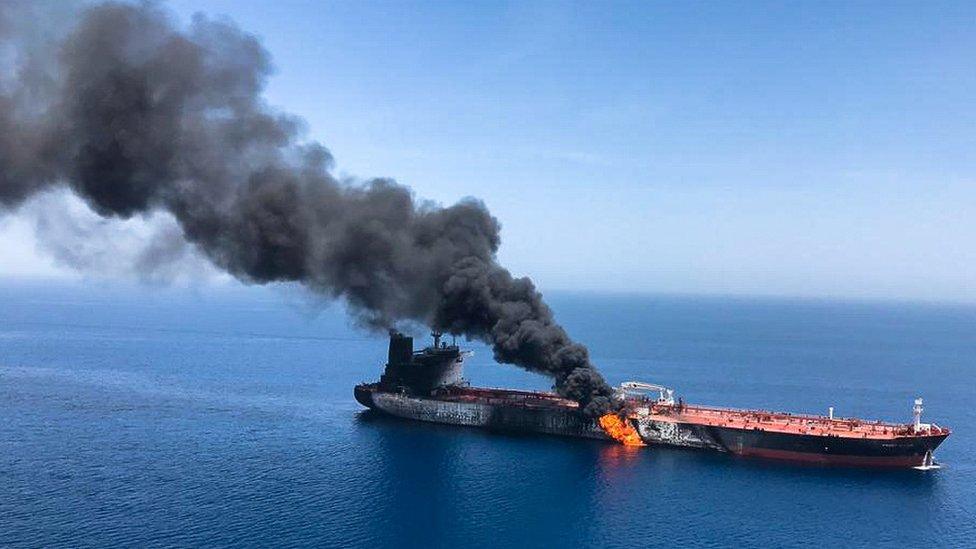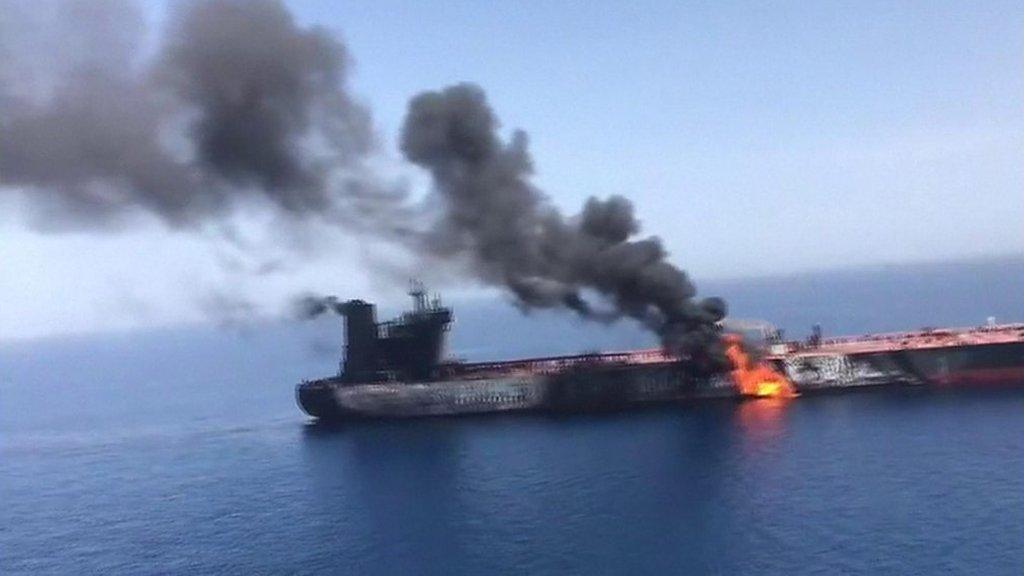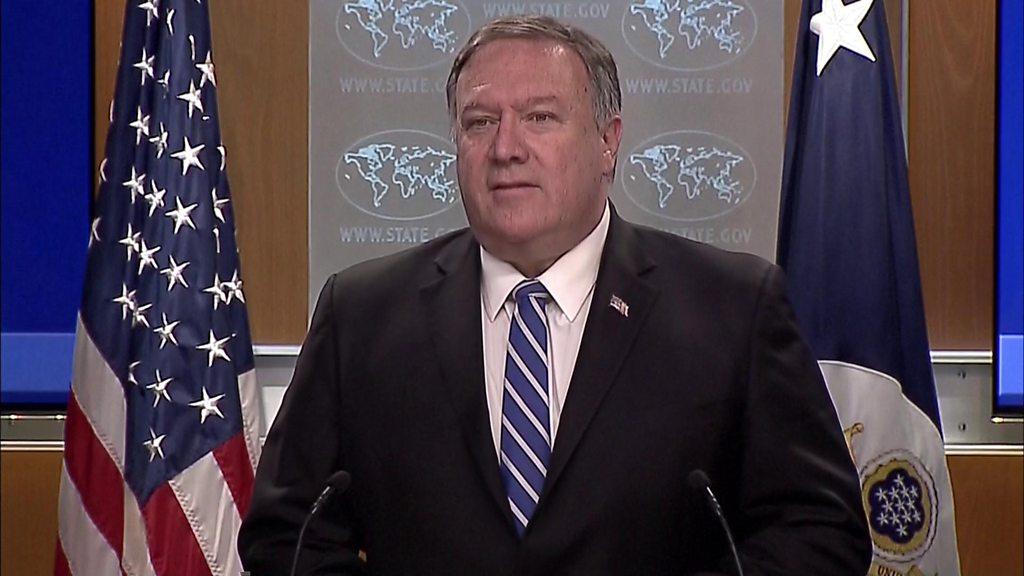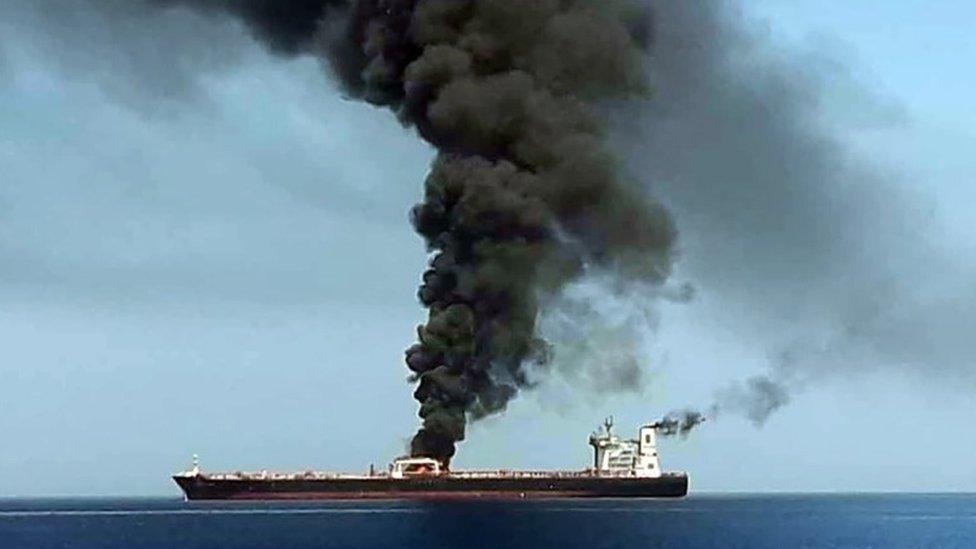Gulf of Oman tanker attacks: Your questions answered
- Published

Japan's Kokuka Courageous and Norway's Front Altair were attacked on 13 June
The US government has accused Iran of being behind explosions which have damaged two tankers in the Gulf of Oman on Thursday.
The Iranian administration has denied any involvement despite the US military releasing a video it claims shows Iranian special forces removing an unexploded mine from the side of one of the tankers.
But what can be said for certain and what could happen next? The BBC's defence and diplomatic correspondent Jonathan Marcus answers questions about the incident sent in by BBC News readers.
Mr G Riordan: Is there a salvage plan? Are the tankers guarded or escorted? Do the tankers have CCTV? How do we make the Strait of Hormuz safe? Is it an act of terror?
A lot of good questions there. I suppose if it turns out to be a state actor, e.g. Iran, behind these attacks then one would not call them "terrorist" as such. Striking at another country's merchant ships might in some circumstances be considered an act of war.
Why does the Strait of Hormuz matter?
A concerted effort to hamper normal shipping in the Gulf would also clearly have significant strategic implications. Currently tankers are not guarded, though in the past, e.g. during the Iran-Iraq war, a convoy system was introduced to shepherd tankers through these confined waters accompanied by warships.
Clearly, experts will now be assessing the extent of the damage to the two vessels. Modern merchant ships may well have CCTV on board to monitor key areas. How much help this might give to any investigation is unclear.
Mike Pompeo: "Unprovoked attacks a clear threat to peace and security"
Anonymous: The Iranian government's past behaviour is a good indicator of their future intentions to create havoc if they are not stopped: but how?
This is certainly how the US and its allies see it. Iran has made threats against merchant shipping in the Gulf and, in the US view, is a highly destabilising actor in the region.
Iran clearly takes a very different view, insisting it has a right to pursue its own regional interests and specifically that it did not target any of these tankers.
What people say and what people do may be different. Iran resents the US intrusion into the Gulf. It is opposed to US policy in the region in Syria and elsewhere.
The danger is that far from being frightened by the reinforced US military presence in the Gulf it may feel that it has some latitude to push back. This is one of the dangerous elements in this equation.
Ray: In this day and age with so much satellite observation why isn't there more proof of who the attackers are?
Well, you are right, satellites can be helpful but many of the most capable intelligence-gathering variety tend to belong to a very small group of countries and even then their coverage is not total. They need to be tasked to look at specific areas.
I have no doubt the US is monitoring Iranian activity in the Gulf from a variety of platforms: satellites; aircraft; communications and signals intercepts; radar tracking and so on. Governments tend to be cautious - especially the Americans - about showing their satellite data. Often they do not want to reveal the full extent of their capabilities.
Security correspondent Frank Gardner looks at the evidence the US says proves Iran's involvement in attacks on two tankers
As an aside, one of the most interesting developments over recent years is the use of civilian satellite data by security researchers and think tanks to significantly amplify our knowledge and to provide a separate source of satellite intelligence. This has, however, generally been used to study fixed locations, e.g. North Korean or Iranian rocket or nuclear facilities. It is very hard for such groups to monitor an area like the Gulf in real-time.

Harry: I want to know how many vessels were hit by mines prior to the US escalating their presence in the region.
The "escalation" of the US military presence is to some extent a propaganda ploy by the US. The presence of a US aircraft carrier battle group for example - currently the USS Abraham Lincoln - is far from unusual. There has indeed been some reinforcement, notably a small number of warplanes; the return of a Patriot anti-missile battery; and a small amphibious unit.
Again, it is all about sending signals rather than necessarily preparing for conflict. But there is no doubt that the US retains a formidable military capability in the region.
As to chronology, the earlier limpet mine attack on the four vessels was on 12 May. Prior to this (around 10 May) the US had announced it was stepping up its deployments to the region following what it said were concerns that Iranian elements or proxy forces were planning a number of attacks against US interests. Specifically, they claim to have seen missiles being loaded onto boats. Subsequently that threat seems to have passed, but in the meantime the four tankers were mined.
The BBC was invited on board the USS Abraham Lincoln in the Arabian Sea
Andrew: You say Trump is string up tensions: but why? I heard he believes the existing deal is bad and wants a better one? Similar tactics to North Korea?
And James: Do you think it was Iran behind these latest attacks, or is it USA trying to stir things up whilst Iran host Shinzo Abe, Japanese PM?
Let's cut to the chase here. Is Iran the most likely country to be responsible for the attacks - probably yes.
Has the United States made a 100 per cent case against Tehran? Not yet.
Will Iran ever admit to these attacks even if its forces did carry them out? Clearly no.
Is anyone else going own up to carrying them out? No.
It is not the BBC's job to ascribe blame but it is our job to bring the evidence to you, to describe the circumstances; and to report and to weigh-up what different people have to say. You then must come to your own conclusion.
As you can imagine many of the messages we get refer to wild conspiracy theories which betray more about their author's thinking than they do an assessment of real day-to-day events.
The US, having walked away from the nuclear deal, is clearly waging a campaign to pressure Iran. But to what end is not clear.
The demands made by key US officials of Tehran are simply unrealistic. The Trump Administration seems to be unclear as to its strategic goals.
Thinking the nuclear deal was a bad one and walking away from it is all very well. But to get a better deal in Mr Trump's terms appears to require Iran to radically change its behaviour and outlook; to almost cease being Iran. That is why critics of Mr Trump say that he really wants regime change in Tehran.
There certainly are people in his administration who support this. But equally Mr Trump, despite all his tweets and bluster, does not want to embark upon new overseas military commitments.
It also has to be said that all the other countries or organisations that were party to the nuclear deal (the JCPOA as it is known) think that whatever its flaws, that deal was better than no deal.
(Goodness, it almost sounds as if I am straying into Brexit!)
Thanks for all the questions.
- Published13 June 2019

- Published13 June 2019

- Published18 June 2019
